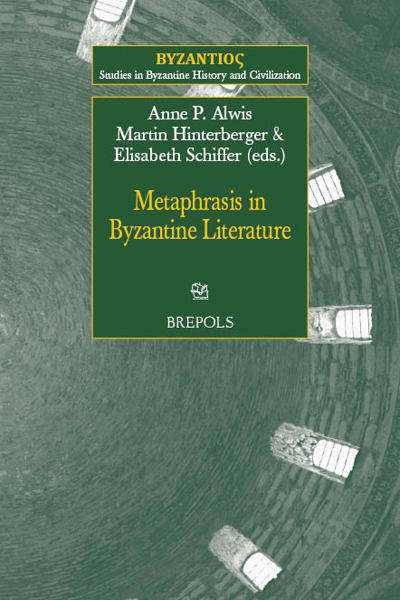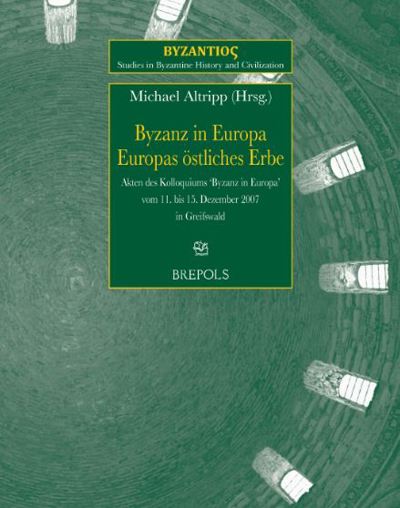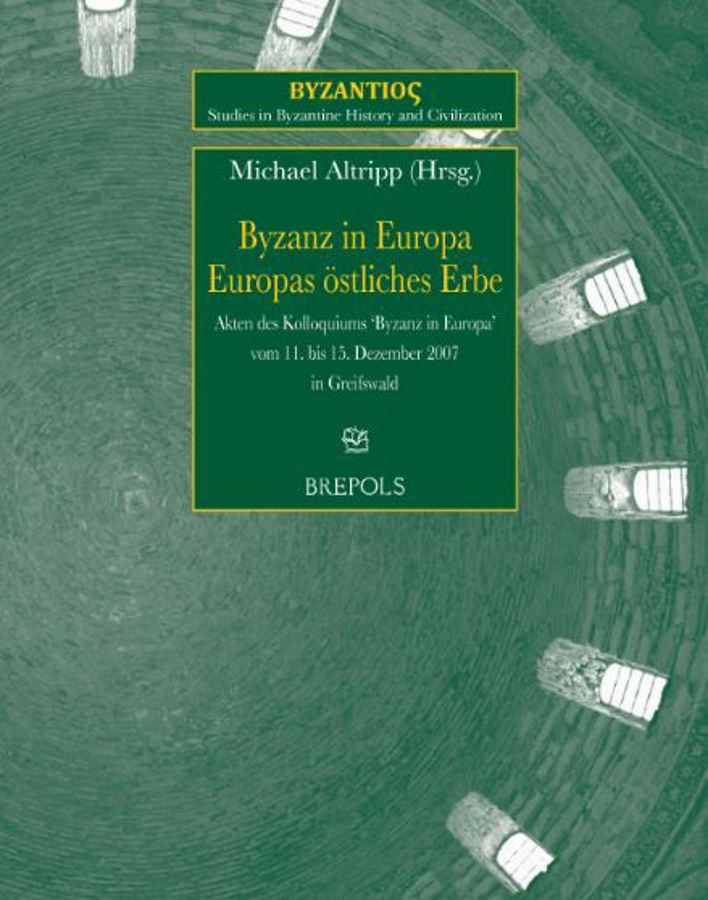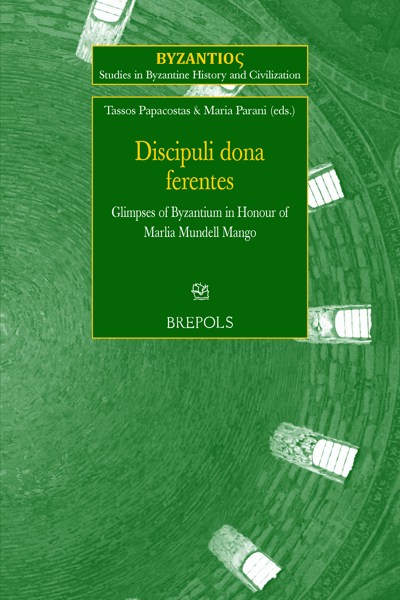
Byzanz in Europa. Europas östliches Erbe
Akten des Kolloquiums 'Byzanz in Europa' vom 11. bis 15. Dezember 2007 in Greifswald
Michael Altripp (ed)
- Pages: x + 502 p.
- Size:156 x 234 mm
- Illustrations:79 b/w
- Language(s):German, English
- Publication Year:2012
- € 110,00 EXCL. VAT RETAIL PRICE
- ISBN: 978-2-503-54153-2
- Paperback
- Available
- € 110,00 EXCL. VAT RETAIL PRICE
- ISBN: 978-2-503-54193-8
- E-book
- Available
"Das vorliegende Buch bietet (...) einen guten politik- und kulturgeschichtlichen Überblick über diese wichtigen Jahre in Florenz." (Helmut Reinalter, in Das Historisch-Politische Buch, Vol. 60, 2012, N° 6, p. 605-606)
« Comme tant d’autres ouvrages avant et après lui, ce livre s’interroge sur les héritages byzantins en Europe. Sa particularité tient à la diversité des approches, des lieux et des périodes traitées. » (Benjamin Moulet, dans Le Moyen Age, 1, 2017, p. 191)
The role of Byzantium in the Middle Ages is comparable to that of a modern political superpower such as the United States. The latter has a pervasive cultural impact on Europe and Asia, and similar cross-cultural relationships between East and West were also evident in medieval Europe, when Byzantine literature, music, art, and ritual were not only known but also studied and appropriated throughout the West. Scholarship on Byzantium and its relationship with Western Europe has yet to explore the full dynamics of this relationship or the extent to which the West was influenced by Byzantine culture. The papers presented in this volume offer a wide interdisciplinary perspective on the crucial importance of Byzantium for Western Europe, featuring articles on art and architectural history, social and religious history, musicology, literature, historiography, gender studies. The essays originate from an interdisciplinary conference, held in the Wissenschaftskolleg Greifswald in December 2007, which brought together an international group of scholars. The proceedings of this gathering give a new and compelling testimony to the exceptionally high status of Byzantine culture in Western Europe and invite further studies on the exceptional and unique role of the Byzantine Empire, positioned at the crux between Europe and Asia.
The volume editor, Michael Altripp, received his PhD in Early Christian Archaeology and Byzantine Art from the University of Mainz, and currently holds an Associate Professorship at the University of Greifswald. His main fields of interests are at the crossroads of art and architecture with theology, and address in particular issues of exegesis, iconography and liturgy, as well as the dynamics of cross-cultural exchange between East and West.
Horst Schneider, Europa und Byzanz: Umberto Ecos Baudolino und die byzantinische Literatur
Alexander Riehle, Fremdsprachendidaktik zwischen Ost und West: Michaelos Apostoles und der Griechischunterricht im Quattrocento
Sebastian Ristow, St. Pantaleon in Köln. Ausgrabungen, Bau- und Forschungsgeschichte der Lieblingskirche von Kaiserin Theophanu
Ralph-Johannes Lilie, Kooperation und Konkurrenz zwischen Byzanz und dem lateinischen Europa im 9. und 10. Jahrhundert
Werner Seibt, Europäische Aristokraten auf byzantinischer Karriereleiter: Ein sigillographischer Beitrag zur Prosopographie des 11. Jahrhunderts
Benjamin Pohl, Schnittpunkt Süditalien: Päpste, Patriarchen und Normannen im späteren 11. Jahr-hundert, 1054 und 1098
Ernst Christoph Suttner, Ökumenische Offenheit im Österreich des 20. Jahrhunderts: Eine Auswirkung insbesondere der Kirchengemeinden. Von byzantinischer Tradition in der Habsburgermonarchie
Igor Pochoshajew, Byzantinische Einflüsse auf antijüdische Polemik der Mozaraber
Drew Maxwell, Byzantine Southern Italy, Monte Cassino and the estrangement of East and West
Gabriele Winkler, Über die Basilius-Anaphora
Oliver Gerlach, About the import of the Byzantine intonation Aianeoeane in a 9th century tonary
Pavlos Tzermias, Die europäische Dimension von Byzanz
Fedor Schlimbach, Byzantinische Einflüsse auf den westgotenzeitlichen Kirchenbau in Hispanien? Bemerkungen zur Herleitung der Motive innerhalb der Baudekoration von Santa María de Quintanilla de Las Viñas (Burgos) im Streit zwischen Visigotistas und Mozarabistas
Jörg Drauschke, Diplomatie und Wahrnehmung im 6. und 7. Jahrhundert: Konstantinopel und die merowingischen Könige
Nino Zchomelidse, Der Lateransalvator und seine mittelalterlichen Repliken - Überlegungen zur Aneignung eines byzantinischen Bildtyps im Westen
Ulrike Koenen, Zur Rezeption byzantinischer Kunstwerke im mittelalterlichen Westen
Sabine-Maria Weitzel, Das romanische Ausmalungsprogramm der St. Marienkirche in Bergen auf Rügen - Überlegungen zu einer Bildkomposition der Weltgerichtsdarstellung
Michael Altripp, Anmerkungen zur sogenannten „Byzantinischen Frage“ - Oder: Byzantiner im Westen
Chryssa Ranoutsaki, Bildgenese und Bildwandel in spätbyzantinischer Zeit
Peter Schreiner, Byzanz und der Osten: Zur Frage politischer und kultureller Gewichtungen einer mittelalterlichen Grossmacht
Ihor Ševčenko, Byzantinists Old and New
Jacek Maj, Die „Byzantinische Frage“ und die polnische Kultur: Ein bibliographischer Bericht
Armenuhi Drost-Abgarjan, Die Rezeption des Hymnos Akathistos in Armenien. Eine neuentdeckte Übersetzung des Akathistos Hymnos aus dem 12. Jahrhundert
Pablo Argárate, Pneumatologische Konzentration - Ein byzantinisches Erbe in der Orthodoxen Theologie
Tagungsablauf des Kolloquiums „Byzanz in Europa: Europas östliches Erbe“
Auswahlbibliographie
Abbildungsverzeichnis




